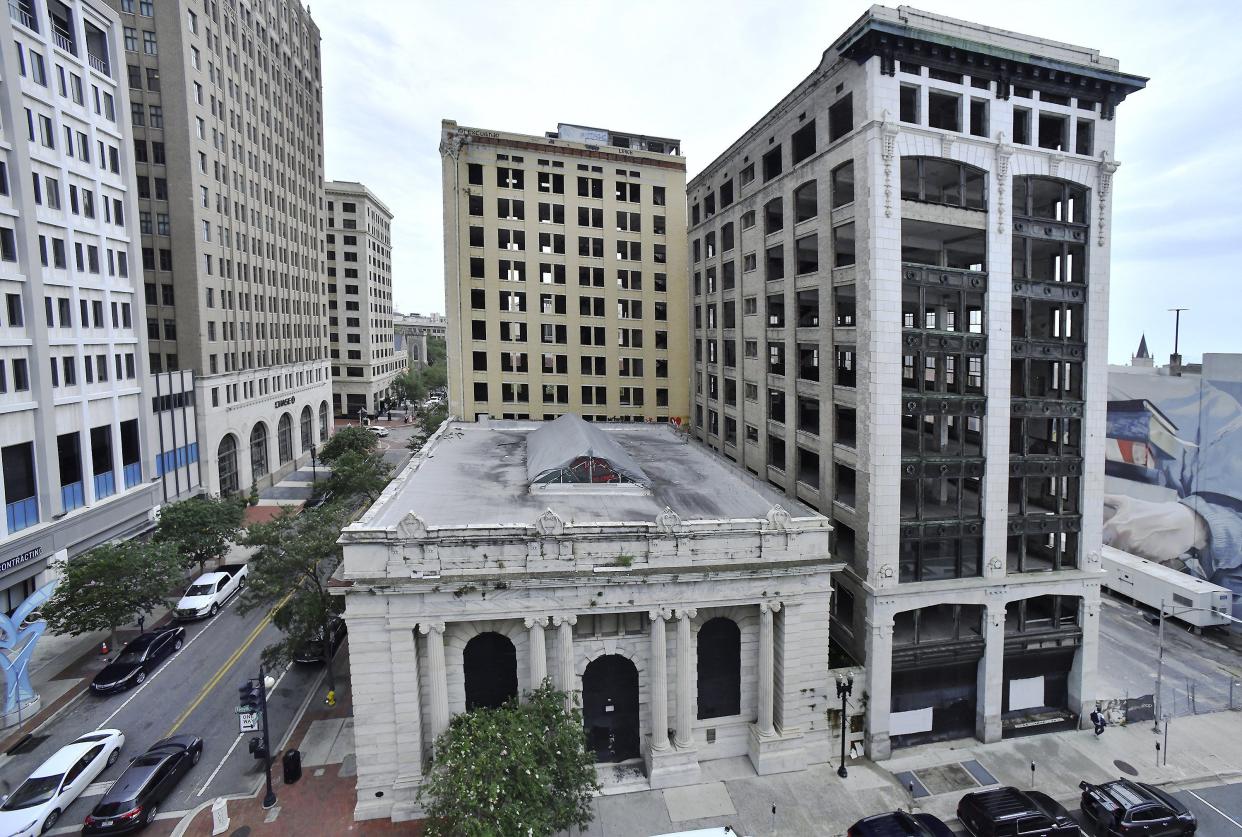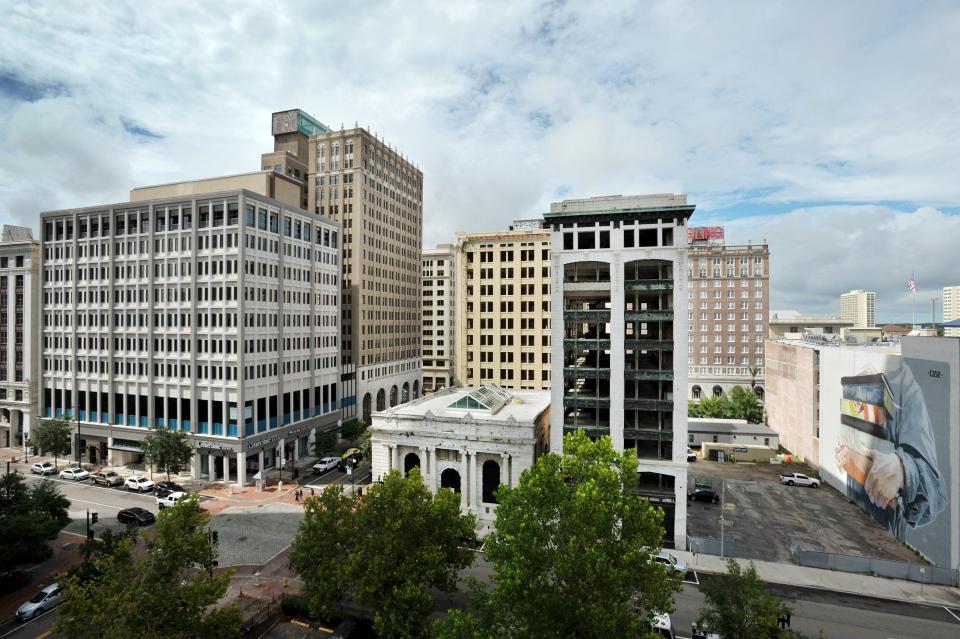Deegan: Time for other options for restoring Laura Street Trio in downtown

Contentious talks between the owner of the Laura Street Trio and city leaders ended without any breakthroughs on redeveloping the historic buildings that have become as well-known recently as a symbol of downtown stagnation as they once were signs of Jacksonville's rebirth a century ago.
Saving the Laura Street Trio has been the centerpiece of the city's downtown development vision for more than 20 years. The Downtown Investment Authority and developer Steve Atkins both say they are committed to revitalizing the Trio but they are not on the same page for how to do it, according to emails they exchanged after the latest attempt at reaching a deal hit a wall.
Mayor Donna Deegan said DIA presented "three very good options" to Atkins and the clock is ticking on getting the Trio restored.
"The reason we wanted to be very intentional about presenting those options to Mr. Atkins was to say look, this is our best final effort to get this in a place where we can get it done," Deegan said. "And from here, if we cannot get it done (with Atkins), we're going to move quickly to whatever our next options are because time is really crucial when it comes to these buildings."
No deal impact: Laura Street Trio owner says demolition might be only option without restoration deal
Controversial terms: Loan guarantee in Laura Street Trio deal draws rebuke. Sponsor calls attacks unfair.
Nate Monroe: Time for Lori Boyer to go as Downtown Investment Authority needs new leadership
Deegan said restoration of the vacant buildings is "priority 1 for us" but did not specify what the options are for accomplishing that. Atkins said this week he wants to keep talking with city officials.
"It is our hope that we and the city of Jacksonville can come to an agreement on terms to move this important project forward as soon as possible," he said.
Atkins has flatly rejected proposals by the city for him to relinquish ownership of the Trio. He also rejected a proposal by DIA for him to drop the hotel piece of his plan to bring a boutique hotel, apartments, restaurants and retail into the heart of downtown.
"To imagine that the city could do a more effective job of development of this site by focusing solely on rehabbing the historic buildings or by isolating one of the uses, without more (uses), is interesting, considering the amount of time, effort and resources the city deployed in mustering water features at the water fountain on the Southbank, a magnificent development indeed considering everything else that's gone vertical in the area over the years besides squirts of water," Atkins wrote in an April 3 email to DIA CEO Lori Boyer.
Capital One loan guarantee at heart of disagreement
He sent that email a day after Boyer wrote that Atkins continues to propose Capital One financing that would require the city to provide an unconditional guarantee that taxpayers would step in to pay off the loan if Atkins cannot, even though the city's Office of General Counsel said in January that such a guarantee would violate the Florida Constitution.
"The Capital One proposal puts us back where we began several months ago — without a viable financing alternative," she wrote.
She said there could be a way to advance negotiations if Atkins would agree to drop the hotel part of the development and use a combination of private financing by Goldman Sachs for apartments along with city financing for the historic restoration.
"Given the more traditional loan proposal from Goldman Sachs for the multi-family project and the city's proposal to fully fund the historic renovation, it seems an opportunity might exist to further negotiate details on those portions of the project, if you weren't insistent on inclusion of the hotel," Boyer wrote.
She said the city "cannot spend further time on a proposal with the inclusion of the Capital One bonds" but DIA "remains committed to the importance of preserving these historic buildings. As previously stated, we will be reviewing our alternatives at this unfortunate stalemate and will be advising the the mayor, City Council, and the DIA board accordingly."
Atkins said in his email response, "Whatever alternatives you will be developing, keep in mind that I own the property. Accordingly, whatever creative measures you come up with to attempt to wrest control of these buildings from me will be met with appropriately commensurate measure. Much as you state you will be advising the mayor, City Council and the DIA board accordingly, we will do the same."

DIA and Atkins entered into the latest round of talks after City Council balked in January at a proposed development deal put forward by Atkins and some council members for rejuvenating the Trio, whose three buildings date back to the decade after the Great Fire of 1901, and building two new 11-story buildings next to them.
That proposed deal involved a $150 million private loan by Capital One. The city would have guaranteed payment of that loan by creating a $22 million pot of money it would replenish as needed to ensure the money is there for those annual repayments.
The city also would have provided $22 million in Downtown Preservation and Revitalization Program loans that would mostly be forgivable, property tax rebates totaling as much as $14.5 million, and a $2 million forgivable loan.
The City Council Auditor's Office, the DIA, and the city's finance department all raised financial concerns about staking the city as guarantor of the Capital One loan. In addition, General Counsel Michael Fackler told City Council the state Constitution prohibits the city from lending its credit for a private purpose like the Laura Street Trio redevelopment.
In talks since then with the city, Atkins proposed a scenario in which Capital One would provide the private loans and a second scenario for Capital One and Goldman Sachs to combine for the private lending.
In both scenarios, the city would still put up $22 million in Downtown Preservation and Revitalization Program loans, property tax rebates totaling as much as $14.5 million, and a $2 million forgivable loan. The city would not create a replenishment fund.
In the first scenario for Capital One to be the lender, the city would pay an estimated $38 million completion grant to SouthEast after the project is finished. In the second scenario where Capital One and Goldman Sachs provide private loans, the completion grant would be nearly $49 million.
A March 27 letter from Capital One says it "shall require an unconditional loan guarantee by the city" for its loan, which would have a fixed interest rate of 6.15%.
DIA board chairman had hoped to get a 'supportable deal' with Atkins
Downtown Investment Authority Board Chairman Jim Citrano, who sat in on the talks between Atkins and Boyer, said in an April 4 letter to City Council President Ron Salem that he committed to work with Atkins and the DIA staff to "find a supportable deal structure that we could bring back to council for consideration."
Citrano said the Capital One term sheet's provisions made it impossible to move forward with the proposals Atkins presented. "Unless and until Mr. Atkins can bring forward a proposal that is deemed to meet the city's legal requirements, I am not in favor of moving forward," Citrano wrote.
Deegan made the same point about the Capital One loan.
"Unfortunately, he came back with something that once again, the general counsel said this is more of the same and not constitutional," Deegan said. "So we cannot in any responsible way move forward with something that we feel is unconstitutional."

Atkins said in his letter to Boyer that his legal team disagrees with the interpretation by the Office of General Counsel and is "candidly perplexed" there hasn't been an opportunity to meet directly with the city attorneys and their outside bond counsel to go through the details of the financing plan.
"While you are reading a shorthand account from a term sheet with regard to an 'unconditional guarantee,' there are numerous ways to structure the city-developer-lender arrangement to avoid what you deem 'fatal' flaws," Atkins wrote.
He said it was "curious and unproductive" for Boyer to declare his latest presentation "untenable" just one business day after hear it on March 29. He also provided information from other institutional lenders that potentially could be involved in the project during that meeting.
City's proposal to take over redevelopment would cost $56 million
The city's proposal for a scaled down development by Atkins would have committed the city to pay $56 million in installments during the restoration of the Laura Street Trio. Atkins would have been required to repay half the money within 12 months of completing restoration and the city would forgive the rest.
In a second option, DIA would buy the buildings and land from Atkins and do the restoration at an estimated cost of about $56 million. The city then could sell the restored structures for at least $35 million so the city's bottom-line cost would be $21 million.
In that option, the city might pay Atkins to be a consultant and give him right of first refusal to purchase the renovated buildings.
The third option entailed DIA acquiring the land and buildings and leasing them back to Atkins for him to restore the Trio. If he didn't get that done by a specified date, the city would terminate the lease and take over.
Boyer informed City Council members the DIA board would vote this month on a resolution that declares Atkins' proposals were unworkable because he wants to keep the hotel in the redevelopment and his proposed financing still would require the city to make an unconditional guarantee on a private loan.
The resolution also would direct Boyer to "investigate further all possible opportunities to save and restore the Laura Street Trio." The resolution does not specify what those possible options might be, but Atkins made clear he's not giving up ownership of the buildings.
"As a Jacksonville-based developer and long-term investor in downtown, my commitment to this project remains steadfast in fulfilling the promise the Laura Street Trio and its fully-programed execution brings to our community," he said in a statement.
He said he still hopes the city and SouthEast can reach an agreement "to move this important project forward as soon as possible."
Atkins successfully renovated the 18-story Barnett Bank building that also had stood vacant for years in downtown. The Residences at Barnett has 107 loft-style apartments with a ground-floor bank. He has owned the Trio since 2013.
City Council member Rory Diamond, who voted in favor of previous development deals for the Trio, said the cost to taxpayers has become too high. "We need to stop throwing money at this project and move on," Diamond said in a post on X.
City Council member Jimmy Peluso, whose district contains downtown, took a different tack by saying it might be time for the city to take control of the property.
"We need to have the conversation about eminent domain for the Trio," he wrote on X. "These buildings are a treasure in Jacksonville, & they’re clearly owned by someone unwilling to do the job correctly."
This article originally appeared on Florida Times-Union: Jacksonville seeks new approach on historic Laura Street Trio
